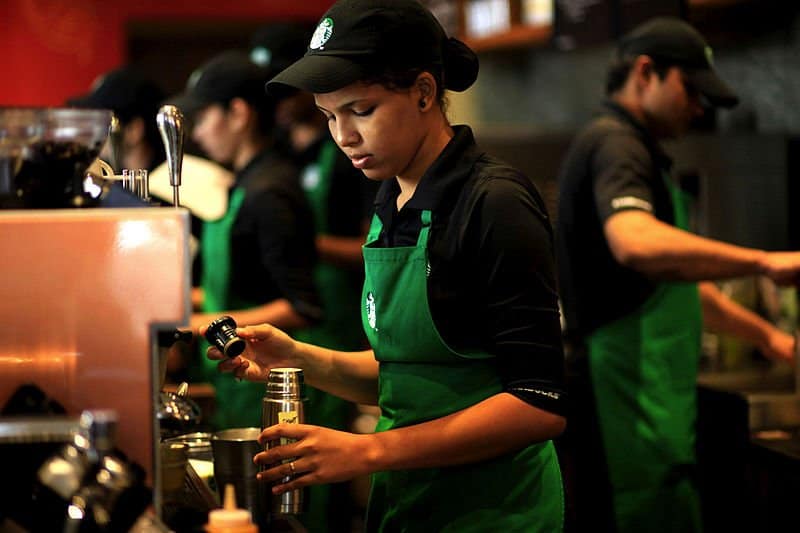Lolita De Palma is a student at Harvard Law School.
The labor market is in good shape. Employers added 225,000 jobs in January. A New York Times article delves into the experience of black workers, whose wages are finally rising after a year of stagnation. While the unemployment rate for black workers over the past year has been the lowest recorded, established structural barriers remain. The unemployment rate for black Americans is still more than double that of whites and that figure does not even factor in the higher rates of incarceration for black Americans. The article tells the story of Mr. Mitchell who recently secured a $38,000-a-year position at JEVS Human Services in Philadelphia after a long string of odd jobs. While Mr. Mitchell has worked hard to gain certifications that will further his career, he is concerned that his lack of a college degree will put him at a disadvantage if there is another economic downturn.
In his State of the Union address, President Trump touted his administration’s economic policies as responsible for the recent increases in the wages for low-income workers. USA Today critiques the President’s statements by pointing out that minimum wage increases in the states have also played a significant role in rising wages.
The National Labor Relations Board has filed a complaint in a federal district court in Portland challenging an Oregon law that prohibits employers from disciplining workers who refuse to attend mandatory meetings on politics, religious matters, or unions. The complaint argues that Oregon’s law conflicts with Congress’ intent under the National Labor Relations Act not to regulate non-coercive employer speech about unions. The Oregon law was previously challenged when it went into effect in 2010, but the judge held that the challenge was not ripe for review until an employer actually disciplined or threatened to discipline an employee in violation of the state law.
In an unrelated case, the National Labor Relations Board found that it has jurisdiction to hear an unfair labor practice charge filed against the conservative online magazine The Federalist for its publisher’s tweet threatening to send workers “back to the salt mine” if they unionize. While the magazine argued that the Board did not have jurisdiction because the initial unfair labor practice charge was filed by a member of the public with no relationship to the publication, Supreme Court precedent has established than any person can file an initial charge with the agency.
New Jersey’s union membership has remained strong despite the loss of manufacturing jobs in the state. Public-sector and private construction unions are popular in New Jersey and construction jobs have been on the rise over the past decade. Total union membership in New Jersey has averaged about 16% over the past 10 years while it has declined from 12.4% to 10.4% in the United States as a whole.
Business Insider highlights income inequality in America by calculating how many hours it takes America’s top CEOs to make what their workers earn in one year. Starbucks CEO Kevin Johnson is first on their list. It takes Mr. Johnson only five hours and 14 minutes to earn what a typical Starbucks employee earns in a year.
Coverage of the PROAct continues with a Salon article criticizing the bill for not including a provision that allows for employees to organize through card check instead of requiring an election.






Daily News & Commentary
Start your day with our roundup of the latest labor developments. See all
July 15
The Department of Labor announces new guidance around Occupational Safety and Health Administration penalty and debt collection procedures; a Cornell University graduate student challenges graduate student employee-status under the National Labor Relations Act; the Supreme Court clears the way for the Trump administration to move forward with a significant staff reduction at the Department of Education.
July 14
More circuits weigh in on two-step certification; Uber challengers Seattle deactivation ordinance.
July 13
APWU and USPS ratify a new contract, ICE barred from racial profiling in Los Angeles, and the fight continues over the dismantling of NIOSH
July 11
Regional director orders election without Board quorum; 9th Circuit pauses injunction on Executive Order; Driverless car legislation in Massachusetts
July 10
Wisconsin Supreme Court holds UW Health nurses are not covered by Wisconsin’s Labor Peace Act; a district judge denies the request to stay an injunction pending appeal; the NFLPA appeals an arbitration decision.
July 9
the Supreme Court allows Trump to proceed with mass firings; Secretary of Agriculture suggests Medicaid recipients replace deported migrant farmworkers; DHS ends TPS for Nicaragua and Honduras